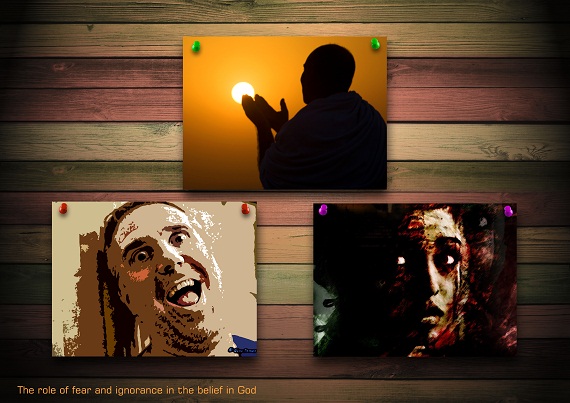question
How do you answer the doubt that some sociologists have expressed which says that the belief in God is an outcome of fear and ignorance?
reviewed
Thursday, 12 August 2010 00:00
reviewed_by_alias
Sayyed Roohullah Musavi
reviewed_by_pid
09373582540
review_text
تغيير سؤال، ويرايش متن، تکميل کليدواژه
bookmark
Divine causation, natural causes, Marxists,God, sociology, belief in God
theism, atheism, the xistence of God, reason and religion, religion and science, scientific suppositions, theology, knowing God
books
{\rtf1\fbidis\ansi\ansicpg1256\deff0\deflang1065{\fonttbl{\f0\fswiss\fprq2\fcharset0 Calibri;}{\f1\froman\fcharset0 GoudyOldStyleT-Regular;}}
{\colortbl ;\red0\green0\blue0;}
\viewkind4\uc1\pard\ltrpar\sl276\slmult1\lang1033\f0\fs28 Another spurious doubt asserted by the sociologists is that the belief in God is an outcome of fear, especially of the dangers of natural disasters such as earthquakes, lightening, etc. They believe that in order to calm his mind man has concocted an imaginary existence, named it God and then started to worship it. However, due to this reason, belief in God becomes subsequently weaker as the causes of such disasters become known and safety precautions can be taken against them. Many Marxists grandiloquently regard this as an accomplishment of the science of sociology and use this as a means for deceiving many immature people. In order to answer their allegations we would say:
\par \pard\ltrpar\fi720\sl276\slmult1 Firstly, the bases of this argument are simply suppositions made by certain sociologists and which do not have any logical or scientific ground for validity.
\par \pard\ltrpar\sl276\slmult1 Secondly, \b in the present century itself there were and indeed are many great thinkers aware of the causes behind these phenomena, and who at the same time have a firm belief in God.\b0 Belief in God is thus not an outcome of fear or ignorance.
\par \pard\ltrpar\fi720\sl276\slmult1 Thirdly, if the fear of some natural phenomenon, or being ignorant of the causes becomes the motive to focus upon God, then it does not mean that God is an outcome of the fear or ignorance of man. Many psychological instincts such as pleasure seeking or lustfulness become the impetus for philosophical, scientific, and technical investigations but do not negatively affect their authenticity.
\par Fourthly, if people recognise God as the originator of that phenomenon whose causes are unknown and if with the discovery of their natural causes their faith becomes weak, then surely it is their view and faith which is weak. This does not provide us with a valid reason to disbelieve in God because the reality is that the Divine causation with regards to the occurrences in the universe is not in the category of natural causes. These causes are not parallel to the Divine causation but rather the Divine causation is transcendental to every material or immaterial cause and the recognition and non-recognition of natural causes will have no efficacy in establishing or not establishing the existence of God.
\par \pard\ltrpar\qr\cf1\f1
\par }
address
Islamic theology , P13-31 by Ayatullah Misbah Yazdi
bookname
Islamic Theology
fieldid
113-09373582540-132
editedby_alias
Kawther Rahmani
Know More Article
Believing in an intangible existence
Knowing God through his creation
Allah: the only real truth
Knowing God: an innate knowledge
Innate knowledge of God
group_know_more
|
Believing in an intangible existence
|
70%
|
|
Knowing God through his creation
|
70%
|
|
Allah: the only real truth
|
50%
|
|
Knowing God: an innate knowledge
|
30%
|
|
Innate knowledge of God
|
30%
|
Related Article
The necessity of God
Knowing God through intrinsic nature
The Ontological Argument in Islamic Metaphysics
Group of Related
|
The necessity of God
|
70%
|
|
Knowing God through intrinsic nature
|
70%
|
|
The Ontological Argument in Islamic Metaphysics
|
70%
|

Another spurious doubt asserted by the sociologists is that the belief in God is an outcome of fear, especially of the dangers of natural disasters such as earthquakes, lightening, etc. They believe that in order to calm his mind man has concocted an imaginary existence, named it God and then started to worship it. However, due to this reason, belief in God becomes subsequently weaker as the causes of such disasters become known and safety precautions can be taken against them. Many Marxists grandiloquently regard this as an accomplishment of the science of sociology and use this as a means for deceiving many immature people. In order to answer their allegations we would say: Firstly, the bases of this argument are simply suppositions made by certain sociologists and which do not have any logical or scientific ground for validity. Secondly, in the present century itself there were and indeed are many great thinkers aware of the causes behind these phenomena, and who at the same time have a firm belief in God. Belief in God is thus not an outcome of fear or ignorance. Thirdly, if the fear of some natural phenomenon, or being ignorant of the causes becomes the motive to focus upon God, then it does not mean that God is an outcome of the fear or ignorance of man. Many psychological instincts such as pleasure seeking or lustfulness become the impetus for philosophical, scientific, and technical investigations but do not negatively affect their authenticity. Fourthly, if people recognise God as the originator of that phenomenon whose causes are unknown and if with the discovery of their natural causes their faith becomes weak, then surely it is their view and faith which is weak. This does not provide us with a valid reason to disbelieve in God because the reality is that the Divine causation with regards to the occurrences in the universe is not in the category of natural causes. These causes are not parallel to the Divine causation but rather the Divine causation is transcendental to every material or immaterial cause and the recognition and non-recognition of natural causes will have no efficacy in establishing or not establishing the existence of God.
